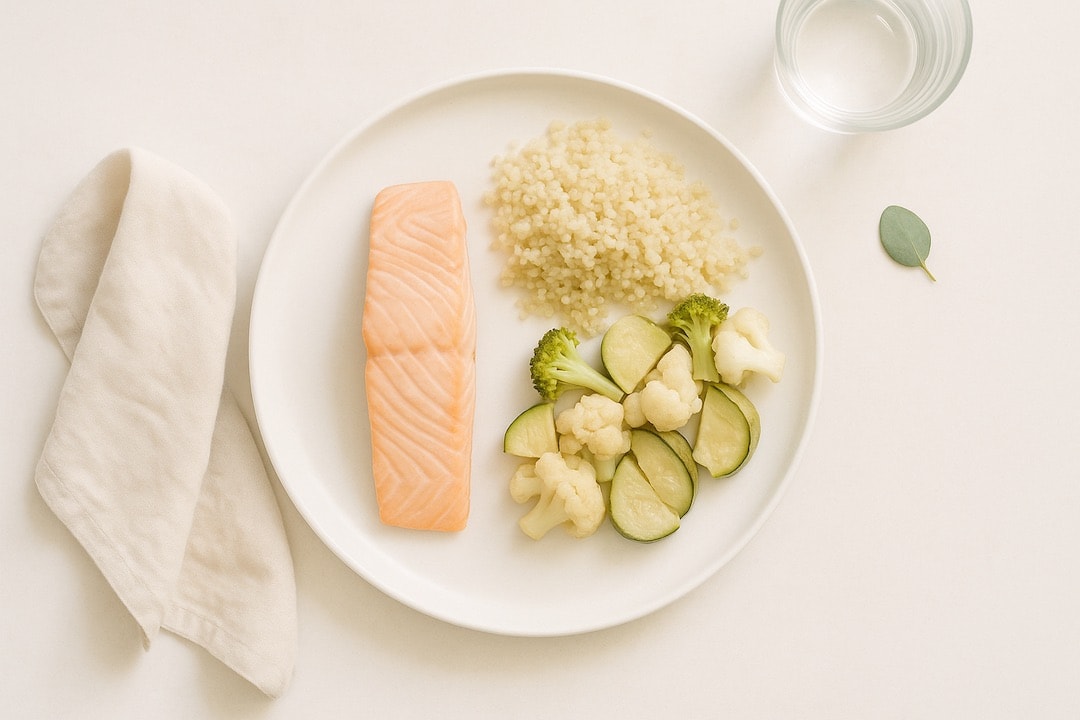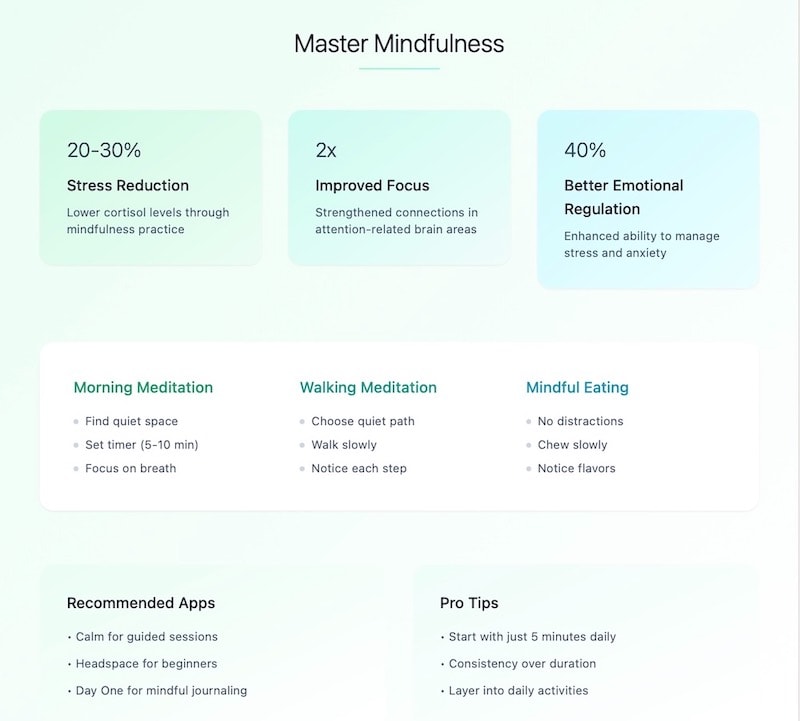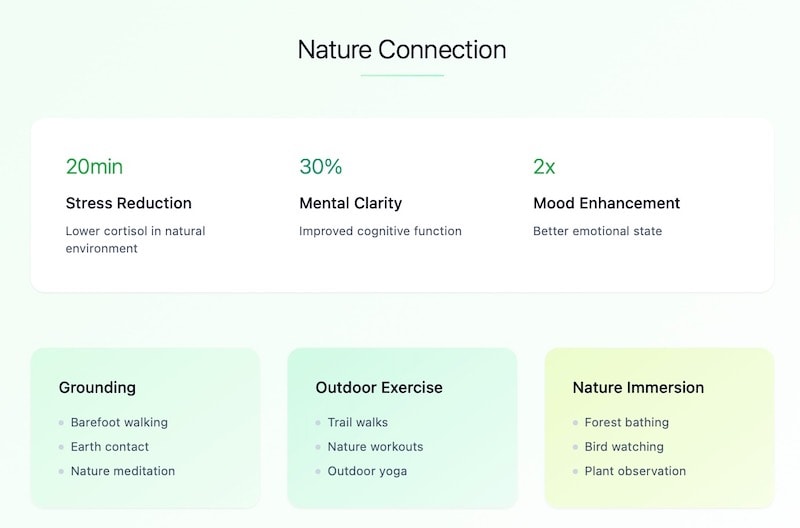Table of Contents
10 Gesunde Gewohnheiten für Jeden Tag: Dein Leitfaden für ein Längeres Gesünderes Leben
This page may contain affiliate links. We may earn a commission on purchases, at no additional cost to you. Learn more →
Kennst du das Gefühl, einfach nur zu funktionieren? Du wachst müde auf, schleppst dich durch den Tag, fällst abends erschöpft ins Bett – nur um morgen alles von vorne zu beginnen? Die meisten von uns wissen, dass wir uns besser ernähren, mehr bewegen und weniger Stress haben sollten. Aber zwischen Wissen und Tun liegen Welten.
Hier ist, was wirklich passiert: Deine täglichen Gewohnheiten bauen dich entweder auf oder zehren an dir. Und wenn du dich gerade ausgelaugt, benebelt oder festgefahren fühlst, arbeiten deine Gewohnheiten vermutlich gegen dich statt für dich.
Gesunde Routinen aufzubauen, die du jeden Tag befolgen kannst, hat nichts mit Perfektion oder radikalen Veränderungen deines Lebensstils zu tun. Es sind einfache, wissenschaftlich fundierte Praktiken, die dein Wohlbefinden – sowohl körperlich als auch mental – tiefgreifend verbessern können. Laut Forschungsergebnissen von Harvard können wesentliche gesunde Gewohnheiten dein Leben um Jahre verlängern und das Risiko für chronische Krankheiten senken.
Optimale Gesundheit zu erreichen, geht nicht über schnelle Lösungen oder teure Programme – es geht darum, gesunde Gewohnheiten aufzubauen, die von Dauer sind. Lass mich dir zeigen, was wirklich funktioniert.

Die wichtigsten Punkte (Wenig Zeit? Fang hier an)
-
Ausreichend Wasser trinken: Trink jeden Tag genug Wasser – unser Körper besteht zu etwa 60% aus Wasser, und selbst leichte Dehydrierung kann deine Energie und Konzentration beeinträchtigen. Ausreichend Wasser zu trinken unterstützt dein Immunsystem und hilft dabei, Schadstoffe aus deinem Körper zu spülen. Ziel sind 2-3 Liter (8-12 Gläser), angepasst an dein Aktivitätslevel. Nutze einen Wasserfilter für sauberes Wasser und füge Spurenelemente oder Meersalz hinzu, wenn du gefiltertes oder destilliertes Wasser trinkst – für optimale Hydration.
-
Ausgewogene Ernährung: Iss vollwertige, nährstoffreiche Lebensmittel (Gemüse, Obst, magere Proteine, gesunde Fette) und reduziere verarbeiteten Zucker und Junkfood. Forschungsergebnisse zeigen, dass pflanzenbetonte Ernährung und richtige Nährstoffzufuhr mit besserer Stimmung und Langlebigkeit verbunden sind. Eine nährstoffreiche Ernährung stärkt dein Immunsystem und unterstützt die Gesundheit deines Gehirns.
-
Regelmäßige Bewegung: Beweg deinen Körper täglich. Mindestens 30 Minuten moderate Aktivität (wie zügiges Gehen) werden empfohlen, plus Krafttraining mindestens zweimal pro Woche. Sport verbessert deine Herz-Kreislauf-Gesundheit, deine Stimmung und sogar dein Gedächtnis. Dr. Peter Attia nennt Bewegung „das wirksamste Medikament für Langlebigkeit".
-
Guter Schlaf: Priorisiere 7-9 Stunden Schlaf pro Nacht. Regelmäßige Schlafenszeiten stärken dein Immunsystem, deine mentale Gesundheit und sogar deine Herzgesundheit. Die American Heart Association zählt Schlaf mittlerweile zu ihren wichtigsten Gesundheitsindikatoren. Schlechter Schlaf ist mit höheren Risiken für Übergewicht, Diabetes und Depressionen verbunden.
-
Stressbewältigung: Praktiziere täglich Gewohnheiten zur Stressreduktion wie Achtsamkeitsmeditation, tiefes Atmen oder auch Entspannung in der Sauna oder einem heißen Bad. Schon 10 Minuten Meditation können den Cortisolspiegel senken. Regelmäßige Saunagänge (4-7 Mal pro Woche) wurden mit einer etwa 40% niedrigeren Gesamtsterblichkeit in Verbindung gebracht.
-
Mentale Gesundheit & Dankbarkeit: Nimm dir Zeit für dein mentales Wohlbefinden. Ein Tagebuch zu führen oder täglich 3 Dinge aufzuschreiben, für die du dankbar bist, kann eine positive Grundhaltung fördern. Pflege positive Beziehungen durch soziale Kontakte oder regelmäßige Gespräche mit deinen Liebsten – starke soziale Bindungen verbessern die mentale Gesundheit und Langlebigkeit.
-
Bildschirmzeit begrenzen: Setze Grenzen bei deinen Geräten. Sinnloses Scrollen zu reduzieren (besonders vor dem Schlafengehen) kann deine Schlafqualität und Stimmung verbessern. Nutze App-Timer oder „digitale Detox"-Phasen, um präsenter und aktiver zu sein.
-
Sonnenlicht & Natur: Geh täglich nach draußen. Sonneneinstrahlung (in Maßen) steigert dein Vitamin D und hilft, deinen zirkadianen Rhythmus für besseren Schlaf zu regulieren. Zeit in der Natur ist mit weniger Stress und verbesserter Konzentration verbunden – selbst ein 10-minütiger Spaziergang an der frischen Luft setzt stimmungsaufhellende Endorphine frei.
-
Zeitlich begrenztes Essen: Begrenze deine tägliche Nahrungsaufnahme auf ein 8-12 Stunden Fenster (z.B. 12 bis 20 Uhr) und faste für 12-16 Stunden. Diese einfache zeitliche Anpassung – ohne zu ändern, was du isst – verbessert die Insulinsensitivität, aktiviert zelluläre Reinigungsprozesse (Autophagie), reduziert Entzündungen und unterstützt ein gesundes Gewicht. Selbst ein 12-Stunden-Essensfenster bietet metabolische Vorteile.
-
Konstanz ist der Schlüssel: Kleine Gewohnheiten summieren sich mit der Zeit. Es dauert durchschnittlich etwa 66 Tage, bis eine neue Gewohnheit zur Routine wird und automatisch abläuft – bleib also dran! Fang mit erreichbaren Zielen an und steigere dich nach und nach.
Was sind „gesunde Gewohnheiten" und warum sind sie wichtig?
Lass uns darüber sprechen, was deine Gesundheit wirklich steuert.
Gesunde Gewohnheiten sind routinemäßige Verhaltensweisen, die deinem körperlichen, mentalen oder emotionalen Wohlbefinden zugutekommen. Sie reichen von täglicher Bewegung und guter Ernährung bis hin zu einfachen Handlungen wie Zahnseide benutzen oder ausreichend Schlaf bekommen.
Diese Tatsache könnte dich überraschen: Die Genetik macht nur geschätzte 20-30% der Lebensdauer eines Menschen aus (Englisch), während der Großteil von Gewohnheiten und Umgebung bestimmt wird. Das bedeutet, du hast mehr Kontrolle, als du denkst.
Eine Harvard-Analyse zeigte, dass Menschen, die fünf risikoarme Lebensstilfaktoren befolgten (gesunde Ernährung, regelmäßige Bewegung, gesunder BMI, Nichtrauchen, moderater Alkoholkonsum), im Durchschnitt 12-14 zusätzliche Lebensjahre gewannen – verglichen mit jenen, die keinen dieser Faktoren befolgten.
Abgesehen davon, dass sie deinem Leben Jahre hinzufügen, verbessern tägliche Gewohnheiten die Lebensqualität enorm. Regelmäßige körperliche Aktivität reduziert nicht nur das Risiko für Herzkrankheiten – sie hebt auch die Stimmung und verbessert die kognitive Funktion, indem sie Botenstoffe im Gehirn wie Endorphine und BDNF steigert und damit die Gesundheit des Gehirns unterstützt. Gute Ernährung und ausreichend Wasser zu trinken können dein Energielevel erhöhen und dir helfen, klarer zu denken. Ausreichend Schlaf verbessert Gedächtnis, Immunfunktion und mentale Gesundheit, während chronischer Schlafmangel mit Problemen wie Depressionen, Bluthochdruck und geschwächtem Immunsystem verbunden ist.
Die gesundheitlichen Vorteile konsequenter täglicher Gewohnheiten sind unbestreitbar. Die Gewohnheiten, die du jeden Tag befolgst, summieren sich entweder auf und fördern deine Vitalität oder zehren an ihr. Wie das Sprichwort sagt: „Wir sind, was wir wiederholt tun."
Und hier kommt der schöne Teil: Selbst wenn du bisher nicht dein gesündestes Leben geführt hast, ist es nicht zu spät. Forschung über „Blue Zone"-Bevölkerungen (Regionen, die für Langlebigkeit bekannt sind) zeigt, dass selbst im fortgeschrittenen Alter die Übernahme gesünderer Ess- oder Bewegungsroutinen die Risikofaktoren für Krankheiten schnell senkt. Bereits eine einzige neue gesunde Gewohnheit in der Lebensmitte anzunehmen, wurde mit einer 2-Jahres-Verlängerung der Lebenserwartung in Verbindung gebracht.
Je mehr positive Gewohnheiten du aufbaust, desto mehr vervielfachen sich diese Vorteile. Optimale Gesundheit zu erreichen ist eine Reise, kein Ziel – und jeder kleine Schritt zählt.
Die Top 10 gesunden Gewohnheiten für jeden Tag
Im Folgenden beschreiben wir zehn tägliche Gewohnheiten – gestützt durch medizinische Forschung und Expertenkonsens – die deine Gesundheit dramatisch verbessern können, wenn du sie konsequent praktizierst.

1. Trink genug Wasser
Ausreichend Wasser zu trinken gehört zu den einfachsten Gesundheitsroutinen und ist ein fester Bestandteil einer guten Morgenroutine. Wasser ist essenziell für nahezu jede Körperfunktion: Es transportiert Nährstoffe zu deinen Zellen, unterstützt die Verdauung, reguliert die Körpertemperatur, polstert Gelenke und hält die Haut gesund.
Schon der Verlust von nur 1-2% des Wassergehalts deines Körpers kann Müdigkeit, Kopfschmerzen, Schwindel und beeinträchtigte Konzentration verursachen. Chronische Dehydrierung über längere Zeit kann zu Nierensteinen, Verstopfung und verringerter körperlicher Leistungsfähigkeit beitragen.
Auf der anderen Seite verbessert ausreichende Flüssigkeitszufuhr dein Energielevel und deine Gehirnfunktion und bringt dich mit mehr Produktivität durch den Alltag.
Wie viel Wasser ist „genug"? Die National Academies of Sciences empfehlen etwa 3,7 Liter für erwachsene Männer und 2,7 Liter für erwachsene Frauen aus allen Getränken und Lebensmitteln, unter moderaten Klima- und Aktivitätsbedingungen. Dein Bedarf steigt, wenn du Sport treibst, in einem heißen Klima lebst, schwanger bist oder stillst – oder auch wenn du Fieber hast.
Eine nützliche Faustregel: Trink täglich 30-40 ml Wasser pro Kilogramm Körpergewicht. Für eine 70 kg schwere Person sind das etwa 2,1 bis 2,8 Liter pro Tag. Du kannst auch die Farbe deines Urins checken: Dunkelgelb bedeutet, dass du wahrscheinlich mehr Flüssigkeit brauchst, während blassgelb auf ausreichende Hydration hinweisen kann.
So setzt du es um: Starte deine Morgenroutine mit einem großen Glas Wasser (nach Stunden des Schlafs ist dein Körper dehydriert). Denk daran, sauberes Wasser zu trinken – nutze einen hochwertigen Wasserfilter, um Verunreinigungen, Chemikalien und Schadstoffe aus deinem Leitungswasser zu entfernen. Wenn du regelmäßig gefiltertes oder destilliertes Wasser trinkst, erwäge, Spurenelemente wieder hinzuzufügen oder eine Prise hochwertiges Meersalz in dein Wasser zu geben. Diese Mineralien (wie Magnesium, Calcium und Kalium) sind essenziell für richtige Hydration und Zellfunktion.
Trag eine wiederverwendbare Wasserflasche bei dir – als visuelle Erinnerung und für einfachen Zugriff. Regelmäßiges Nippen ist effektiver als gelegentliches Herunterkippen großer Mengen. Wenn dir pures Wasser zu langweilig ist, gib natürlichen Geschmack mit Zitronenscheiben oder Beeren dazu. Vergiss nicht, dass auch Obst und Gemüse (wie Gurken, Wassermelone, Orangen) zur Hydration beitragen.
Wasser unterstützt Verdauung, Durchblutung, Temperaturregulation und hilft sogar dabei, Falten vorzubeugen, indem es die Haut mit Feuchtigkeit versorgt. Es ist wirklich die einfachste tägliche Gewohnheit für bessere Gesundheit – also hab deine Wasserflasche immer griffbereit und trink ausreichend!

2. Ernähre dich ausgewogen und nährstoffreich
„Lass Nahrung deine Medizin sein", heißt es so schön – und die Wahl gesunder Lebensmittel jeden Tag ist eine grundlegende Gewohnheit, die dein Wohlbefinden tiefgreifend beeinflusst.
Eine ausgewogene Ernährung liefert den Treibstoff und die Nährstoffe, die dein Körper braucht, um optimal zu funktionieren, ein gesundes Gewicht zu halten und Krankheiten vorzubeugen. Praktisch gesehen bedeutet eine gesunde tägliche Ernährung, vollwertige, nicht verarbeitete Lebensmittel zu bevorzugen: viel Gemüse und Obst, magere Proteine, Vollkornprodukte und gesunde Fette (Olivenöl, Nüsse, Avocados), während du Zucker, raffinierte Kohlenhydrate und verarbeitete Lebensmittel reduzierst.
Forschung hat solche Ernährungsmuster (wie die mediterrane oder pflanzenbasierte Ernährung) wiederholt mit geringeren Risiken für Herzkrankheiten, Diabetes, bestimmte Krebsarten und verbesserter Langlebigkeit in Verbindung gebracht. Die wegweisende Harvard Nurses' Health Study fand heraus, dass Menschen mit den höchsten Ernährungsqualitätswerten (reich an pflanzlichen Lebensmitteln und guten Fetten) eine signifikant niedrigere Sterblichkeit hatten als jene mit der schlechtesten Ernährung.
Dr. Mark Hyman, ein Arzt für funktionelle Medizin und Langlebigkeitsexperte, empfiehlt, „den Regenbogen zu essen" – stelle sicher, dass mindestens 75% deines Tellers bei jeder Mahlzeit mit farbenfrohen pflanzlichen Lebensmitteln (wie Blattgemüse, Beeren, buntem Gemüse) gefüllt sind. Diese lebendigen Lebensmittel stecken voller Vitamine, Mineralien, Ballaststoffe und Phytochemikalien (pflanzliche Verbindungen, die Entzündungen und oxidativen Stress bekämpfen).
Er betont außerdem, bei jeder Mahlzeit gesunde Fette und Proteine einzubeziehen – für die metabolische Gesundheit und die Gesundheit des Gehirns. „Mein Gehirn funktionierte vorher schon ganz gut, aber als ich begann, mehr Fett zu mir zu nehmen (sogar gute gesättigte Fette wie Kokosöl), ist meine mentale Klarheit durch die Decke gegangen", bemerkt Dr. Hyman und verweist auf Omega-3-Fettsäuren aus Fisch, Nüssen und Olivenöl als wichtige Gehirn-Booster.
Protein ist essenziell für den Erhalt von Muskelmasse und stabiler Energie – ziele auf etwa 20-30 Gramm Protein pro Mahlzeit (aus Quellen wie Eiern, Geflügel, Hülsenfrüchten, Joghurt usw.). Ausreichend Protein hilft, den Appetit zu kontrollieren und unterstützt die Muskelreparatur, was besonders wichtig ist, wenn wir älter werden.
Was du vermeiden oder minimieren solltest: Dr. Hyman und die meisten Ernährungsexperten raten dazu, zugesetzten Zucker, raffinierte Stärke, Transfette und stark verarbeitete Lebensmittel einzuschränken. Diese können deinen Stoffwechsel und dein Entzündungsniveau stark durcheinanderbringen.
So setzt du es um: Plane voraus, um dich auf Erfolg einzustellen. Meal Prep am Wochenende oder die Planung der Abendessen für die Woche können dir helfen, nicht auf Fast Food oder Lieferdienste zurückzugreifen, wenn du im Stress bist. Fülle deine Küche mit gesunden Basics: Tüten mit gefrorenem Gemüse, Dosenbohnen, vorgewaschenen Salaten, Obst und rohen Nüssen. Versuche, mehr zu Hause zu kochen – Studien zeigen, dass selbst gekochte Mahlzeiten generell gesünder und kalorienärmer sind als Restaurantessen.
Nutze das „Gesunde Teller"-Modell: Fülle ungefähr die Hälfte deines Tellers mit Gemüse und Obst, ein Viertel mit magerem Protein, ein Viertel mit Vollkornprodukten oder stärkehaltigem Gemüse, plus eine kleine Portion gesunder Fette.

3. Bewege dich regelmäßig und halte deinen Körper aktiv
Wenn es ein Wundermittel für Gesundheit gäbe, wäre es dieses hier.
Regelmäßige körperliche Aktivität ist vermutlich das Nächste, was es zu einer Wunderpille gibt. Tägliche Bewegung (oder zumindest an den meisten Tagen der Woche) verbessert die Herz-Kreislauf-Gesundheit, stärkt Muskeln und Knochen, hebt die Stimmung und Gehirnfunktion und reduziert das Risiko für praktisch jede chronische Krankheit.
Das muss nicht bedeuten, nur intensive Gym-Sessions zu absolvieren – alle Aktivitäten zählen, selbst moderate wie zügiges Gehen, Radfahren oder Tanzen. Der Schlüssel liegt darin, langes Sitzen zu vermeiden und dich häufig zu bewegen.
Die U.S. CDC und das Gesundheitsministerium empfehlen mindestens 150 Minuten moderate aerobe Bewegung pro Woche (z.B. 30 Minuten an 5 Tagen), oder 75 Minuten intensive Bewegung, plus muskelstärkende Aktivitäten an 2 oder mehr Tagen wöchentlich. Diese Richtlinien zu erreichen oder zu übertreffen, ist mit besserem Gewichtsmanagement, verbessertem Blutdruck und einer längeren Lebensdauer verbunden.
Tatsächlich fand eine umfassende Studie aus 2018 mit über 122.000 Teilnehmern heraus, dass jene mit der höchsten kardiorespiratorischen Fitness die niedrigsten Sterberaten hatten, und dass Unfitness genauso schädlich war wie chronische Krankheiten wie Diabetes.
Dr. Peter Attia, ein Arzt mit Fokus auf Langlebigkeitswissenschaft, drückt es deutlich aus: „Bewegung ist bei Weitem das wirksamste Langlebigkeits-‚Medikament', das wir haben." Er bemerkt, dass konsequente Bewegung nicht nur die Lebensdauer verlängert, sondern auch kognitiven Abbau und Behinderungen besser verzögert als jedes Medikament oder Nahrungsergänzungsmittel.
Aber lass dich nicht einschüchtern – jede Steigerung der Bewegung hilft. Wenn du gerade einen sitzenden Lebensstil pflegst, fang mit kleinen Schritten an: Mach 10-15-minütige Spaziergänge in der Mittagspause, nimm die Treppe statt den Aufzug, dehne dich oder mach schnell ein paar Kniebeugen. Dr. Rhonda Patrick, eine biomedizinische Wissenschaftlerin, setzt sich für „Bewegungs-Snacks" ein – kurze Ausbrüche körperlicher Aktivität, über deinen Tag verteilt. Das könnten 30 Sekunden Hampelmänner sein, eine Minute Treppensteigen oder ein schneller Satz Liegestütze zwischen Meetings. Diese Mini-Workouts summieren sich und können deine metabolische Gesundheit und kardiovaskuläre Fitness erheblich verbessern, selbst wenn du keine Zeit für ein traditionelles Training hast.
Die Wellness-Experten der Cleveland Clinic betonen, kreativ zu sein: Nutze Haushaltsgegenstände (wie Wasserkanister) für Kraftübungen, mach Stuhlkniebeugen oder Schreibtisch-Liegestütze, wenn du nicht ins Fitnessstudio kannst.
Selbst kurze 10-Minuten-Einheiten haben echte Effekte. Forschung zeigt, dass bereits ein 10-minütiger zügiger Spaziergang deine kardiovaskuläre Fitness steigern und deine Stimmung heben kann.
Finde Aktivitäten, die dir Spaß machen, damit Sport keine lästige Pflicht wird. Das könnte eine Sportart sein, ein Tanzkurs, Yoga, Radfahren mit einem Freund oder mit deinem Hund im Park spazieren gehen. Eine Mischung aus Cardio (für Herz-/Lungengesundheit) und Kraft- oder Widerstandstraining (für Muskel- und Knochengesundheit) bietet die besten Gesamtvorteile.
Entscheidend ist: Bewegung ist genauso wichtig für den Geist wie für den Körper. Körperliche Aktivität löst die Ausschüttung von Endorphinen und Serotonin aus, die helfen, Stress, Angst und Depressionen zu reduzieren. „Sport verbessert Gedächtnis, Lernen und Konzentration. Er hilft auch, deine Stimmung zu verbessern, deine Energie zu steigern und den gesamten Stress in deinem Körper und Geist zu reduzieren", sagt Dr. Mark Hyman.
Mach Bewegung zu einem nicht verhandelbaren Termin mit dir selbst. Behandle dein Training wie wichtige Meetings. Mit der Zeit wird dein Körper anfangen, sich nach Bewegung zu sehnen. Denk daran: „Motion is lotion" für deinen Körper – beweg ihn also täglich, damit er gedeiht!

4. Priorisiere guten Schlaf (Konstante Schlafenszeiten)
Ausreichend hochwertigen Schlaf jede Nacht zu bekommen, wird oft unterschätzt, ist aber absolut entscheidend für deine Gesundheit und dein tägliches Funktionieren.
Schlaf ist die Zeit, in der dein Körper Gewebe repariert, dein Gehirn Erinnerungen festigt und Schadstoffe abbaut, und deine Hormone Appetit und Stress regulieren. Chronisch unzureichender Schlaf (generell weniger als 7 Stunden für Erwachsene) ist mit einer Vielzahl von Problemen verbunden: erhöhtes Risiko für Übergewicht, Diabetes, Herzkrankheiten, Schlaganfall, Depressionen und geschwächter Immunfunktion.
Umgekehrt sind konstante 7-9 Stunden Schlaf pro Nacht für Erwachsene mit besserer Stimmung, schärferer kognitiver Leistung und längerer Lebenserwartung verbunden. In Anerkennung der vitalen Rolle von Schlaf fügte die American Heart Association 2022 „Gesunden Schlaf" als neueste Komponente zu ihrer Checkliste für kardiovaskuläre Gesundheit (Life's Essential 8) hinzu, neben Ernährung, Bewegung, Nichtrauchen usw. Sie empfehlen 7-9 Stunden für Erwachsene als optimal für Herz- und Gesamtgesundheit.
Es geht nicht nur um die Menge – Konstanz und Qualität zählen ebenfalls. Regelmäßige Schlafenszeiten beizubehalten (jeden Tag etwa zur gleichen Zeit ins Bett gehen und aufwachen, auch am Wochenende) hilft, deine innere Uhr (zirkadianer Rhythmus) zu regulieren und macht es einfacher, einzuschlafen und erfrischt aufzuwachen.
Dr. Andrew Huberman (Neurowissenschaftler in Stanford) betont die Bedeutung einer stabilen Schlafroutine und morgendlicher Lichtexposition, um deinen zirkadianen Rhythmus zu verankern. Er rät, innerhalb einer Stunde nach dem Aufstehen helles Licht in deine Augen zu bekommen (10 Minuten Sonnenlicht im Freien an klaren Tagen oder etwa 20 Minuten bei bewölktem Himmel), um deinem Gehirn zu signalisieren, dass es Tag ist. Diese Praxis verbessert nachweislich die nächtliche Schlafqualität und Stimmung. Abends können gedimmtes Licht und das Vermeiden von Bildschirmen (Blaulicht) eine Stunde vor dem Schlafengehen deinem Körper helfen, Melatonin für den Schlaf zu produzieren.
So setzt du es um: Lege zunächst eine Ziel-Schlafenszeit und Aufwachzeit fest, die etwa 8 Stunden im Bett ermöglicht. Etabliere eine entspannende Abendroutine (30-60 Minuten), um deinem Körper zu signalisieren, dass es Zeit ist herunterzufahren – das könnte das Dimmen der Lichter, ein Buch lesen, sanftes Dehnen oder eine warme Dusche beinhalten.
Versuche, schwere Mahlzeiten, Koffein und Alkohol zu kurz vor dem Schlafengehen zu vermeiden, oder zumindest 3-4 Stunden vorher, da sie die Schlafzyklen stören können. Stelle sicher, dass deine Schlafumgebung kühl, dunkel und ruhig ist: Erwäge Verdunkelungsvorhänge oder eine Schlafmaske, Ohrstöpsel oder eine White-Noise-Maschine, falls nötig.
Halte elektronische Geräte außer Reichweite oder in einem anderen Raum; die Versuchung, um Mitternacht zu scrollen, kann deine Ruhe sabotieren. Eine kurze Meditation kann einen rastlosen Kopf beruhigen – Forschung zeigt, dass selbst 10 Minuten Achtsamkeit Stresshormone senken und die Einschlafzeit verbessern können.
Achte auch auf deine Nachmittags- und Abendgewohnheiten: Begrenze die Koffeinzufuhr nach dem späten Nachmittag (Koffeins Halbwertszeit kann 5-6 Stunden oder mehr betragen) und vermeide intensives Training zu kurz vor dem Schlafengehen.
Die Vorteile, Schlaf zu priorisieren, werden sich schnell zeigen: Du wirst wahrscheinlich Verbesserungen bei Stimmung, Konzentration und sogar Appetit bemerken (Schlafmangel bringt Hungerhormone durcheinander, was Menschen zu viel essen lässt). Eine kardiologische Studie fand heraus, dass Menschen, die regelmäßig weniger als 6 Stunden schliefen, ein signifikant höheres Risiko hatten, Bluthochdruck zu entwickeln, als jene, die 7-8 Stunden schliefen.
Mach Schlaf zur Priorität, und du wirst mehr produktive, energiegeladene Stunden in deinem Tag gewinnen, als du „verlierst", indem du rechtzeitig ins Bett gehst.

5. Bewältige Stress und praktiziere Achtsamkeit
In unserem hektischen Leben kann chronischer Stress zum Alltag werden – aber Stressbewältigung ist eine Gewohnheit, die wir um unserer Gesundheit willen kultivieren müssen.
Hohe Stresslevel lösen die Ausschüttung von Hormonen wie Cortisol und Adrenalin aus, die uns in kleinen Dosen helfen, Herausforderungen zu bewältigen. Wenn Stress jedoch unaufhörlich ist, bleiben diese Hormone erhöht und können im Körper Chaos anrichten: Sie tragen zu hohem Blutdruck, geschwächter Immunität, Angst/Depressionen und beschleunigter Alterung durch Entzündungen bei. Bei Frauen nach 35 kann anhaltender Stress zu einer früheren Perimenopause und stärkeren Symptomen führen, da Stress die hormonelle Regulation negativ beeinflussen und psychologische sowie körperliche Symptome im Zusammenhang mit dem Übergang in die Menopause verschlimmern kann.
Deshalb ist es essenziell, tägliche Gewohnheiten zu entwickeln, um Stress zu reduzieren und mentale Ruhe zu fördern. Das kann Praktiken wie Achtsamkeitsmeditation, Atemübungen, Yoga, Tagebuchschreiben, Gebet oder einfach ruhige Zeit in der Natur beinhalten – was auch immer dir hilft, zurückzufinden und Balance zu schaffen.
Selbst eine kurze Meditation oder Atemübung (5-10 Minuten) täglich bringt messbare Vorteile.
Eine einfache, durch Forschung gestützte Technik ist der „physiologische Seufzer", hervorgehoben von Dr. Andrew Huberman. Dabei atmest du lang durch die Nase ein, dann nimmst du einen zweiten kurzen Atemzug, um die Lungen vollständig zu füllen, und atmest langsam durch den Mund aus. 2-3 dieser Seufzer-Atemzüge können Angst im Moment schnell reduzieren, indem sie das parasympathische (beruhigende) Nervensystem aktivieren.
Studien zeigen, dass Meditationspraxis das Gehirn mit der Zeit neu verdrahten kann – sie erhöht graue Substanz in Bereichen, die mit emotionaler Regulation verbunden sind – und kann den Ruhe-Cortisolspiegel senken.
So setzt du es um: Integriere Stressabbau in deine Routine, indem du ihn mit bestehenden Signalen verknüpfst. Du könntest zum Beispiel morgens direkt nach dem Aufstehen meditieren (um einen ruhigen Ton für den Tag zu setzen) oder abends als Teil deines Herunterfahrens tief atmen. Manche finden Nutzen in einer achtsamen Pause zur Mittagszeit – für 5 Minuten von der Arbeit wegzutreten, um zu atmen oder sich zu dehnen, kann verhindern, dass sich Stress ansammelt.
Du kannst Apps nutzen (wie Headspace, Calm oder Insight Timer), die geführte Meditationen anbieten und dich daran erinnern können, innezuhalten. Der Schlüssel ist Konstanz: Ein paar Minuten täglich schlagen eine lange Einheit gelegentlich.
Über formale Entspannungspraktiken hinaus solltest du Anpassungen im Lebensstil erwägen, die Stress abpuffern. Dazu gehört, „Nein" zu sagen, wenn du es brauchst (gesunde Grenzen für deine Zeit und Energie zu setzen), Zeit für Hobbys und Spaß zu schaffen und sicherzustellen, dass du soziale Unterstützung hast.
Manchmal kann etwas so Einfaches wie ein täglicher Spaziergang draußen meditativ sein – die Natur hat eine beruhigende Wirkung auf den Geist. Deine tägliche Exposition gegenüber negativen Nachrichten oder dem endlosen Scrollen durch Social Media zu begrenzen, ist eine weitere Möglichkeit, die mentale Belastung zu reduzieren.
Ein weiterer kraftvoller Stressreduzierer: Dankbarkeitspraxis. Es mag weich klingen, aber Forschung bestätigt, dass das Aufschreiben einiger Dinge, für die du dankbar bist, deine Denkweise verändern und wahrgenommenen Stress reduzieren kann. Versuch, ein kleines Dankbarkeitstagebuch an deinem Bett zu halten und notiere jeden Abend 3 positive Dinge aus deinem Tag.
Wie Dr. Mark Hyman empfiehlt: „Lerne, aktiv zu entspannen. Um die mächtigen Kräfte des Geistes auf den Körper wirken zu lassen, musst du etwas tun – versuche Meditation oder lerne etwas Neues" als Weg, aus Stressschleifen auszubrechen.
Erwäge schließlich Wärmetherapie zur Stressentlastung, falls möglich: Entspannung in einer Sauna, einem Dampfbad oder einem heißen Bad löst eine Entspannungsreaktion und die Ausschüttung von Endorphinen aus. Häufige Saunagänger (4+ Mal pro Woche) in Finnland haben nachweislich signifikant niedrigere Raten an Depressionen und sogar Demenz. Jene, die 4-7 Mal pro Woche in die Sauna gingen, hatten etwa 40% niedrigere Gesamtsterberaten – Stressreduktion wird als ein beitragender Faktor angesehen.
Zusammengefasst: Stressbewältigung zu einer täglichen Gewohnheit zu machen (genau wie Zähneputzen) wird sich in jedem Bereich deiner Gesundheit auszahlen. Du wirst wahrscheinlich feststellen, dass du geduldiger, fokussierter und emotional widerstandsfähiger bist. Denk daran, dass du nicht immer kontrollieren kannst, was das Leben dir jeden Tag vor die Füße wirft, aber du kannst kontrollieren, wie du darauf reagierst.

6. Knüpfe soziale Verbindungen und pflege Beziehungen
Menschen sind von Natur aus soziale Wesen – echte Verbindungen zu anderen sind kein Luxus, sondern eine tägliche Gewohnheit, die entscheidend für unsere Gesundheit ist.
Studien zeigen immer wieder: Wer enge Beziehungen zu Familie, Freunden oder Gemeinschaften pflegt, lebt nicht nur länger, sondern hat auch bessere mentale und körperliche Gesundheit. Eine berühmte Harvard-Studie, die Männer über 75 Jahre lang begleitete, fand sogar heraus: Die Qualität der Beziehungen im mittleren Lebensalter sagte die spätere Gesundheit besser voraus als der Cholesterinspiegel!
Einsamkeit und soziale Isolation dagegen erhöhen das Risiko für Depressionen, geistigen Abbau und Herz-Kreislauf-Erkrankungen.
Doch wie sieht eine gesunde soziale Routine im Alltag aus? Oft reicht es schon, sich täglich ein paar Minuten Zeit zu nehmen, um mit anderen in Kontakt zu treten. Das kann ein persönliches Gespräch mit einem Freund oder Familienmitglied sein, ein kurzer Anruf bei den Eltern, eine Nachricht an eine Freundin oder ein kleiner Plausch mit einem Kollegen.
Bereits zehn Minuten am Tag, in denen du bewusst Kontakt zu lieben Menschen hältst, können Gefühle von Einsamkeit verringern und dein seelisches Wohlbefinden stärken. Mit der Zeit entsteht so ein stabiles Netzwerk aus Beziehungen, das dich auch in herausfordernden Momenten trägt.
Wenn du einen vollen Terminkalender hast oder weit entfernt von Freunden und Familie wohnst, nutze Technik achtsam, um verbunden zu bleiben. Ein fest eingeplanter täglicher Anruf oder Videochat kann Nähe bewahren. Gleichzeitig lohnt es sich, den eigenen sozialen Kreis im Alltag zu erweitern: Sag Hallo zu deinen Nachbarn, plaudere kurz mit der Barista oder dem Kassierer, oder tritt einem Verein, Kurs oder Sportteam bei, um Menschen mit ähnlichen Interessen kennenzulernen.
Der Neurowissenschaftler Dr. Andrew Huberman bezeichnet soziale Bindungen als eine der „Säulen der mentalen Gesundheit“. Positive Interaktionen setzen im Gehirn Oxytocin und Endorphine frei – Stoffe, die Stress entgegenwirken.
Auch in den sogenannten Blue Zones – Regionen der Welt, in denen Menschen besonders alt werden – spielen starke familiäre und gemeinschaftliche Bindungen eine zentrale Rolle. In Okinawa (Japan) etwa gründen Menschen sogenannte Moai: kleine Gruppen lebenslanger Freunde, die sich gegenseitig im Alltag unterstützen. Diese enge Verbundenheit gilt als einer der Gründe für ihre außergewöhnliche Lebensdauer.
Mach soziale Kontakte zu einem festen Bestandteil deiner Gesundheitsroutine – genauso selbstverständlich wie Bewegung oder Ernährung. Vielleicht ist es genau diese zehnminütige Gewohnheit, die dein Glück und deine Stressresistenz spürbar stärkt. Also: Schreib einer Freundin, umarm deine Familie, fang ein Gespräch an – diese kleinen Momente der Nähe bereichern und verlängern unser Leben auf wundervolle Weise.
7. Begrenze deine Bildschirmzeit und vermeide digitalen Overload
In unserer modernen Welt ist eine Gewohnheit besonders wichtig für deine Gesundheit: bewusst mit deiner Bildschirmzeit umzugehen.
Viele von uns verbringen täglich Stunden vor dem Smartphone, Computer oder Fernseher. Natürlich bringt Technologie viele Vorteile – aber zu viel davon, besonders Social Media, Nachrichten oder Arbeits-E-Mails, kann Stress verursachen, deine Bewegung im Alltag reduzieren, die Augen belasten und deinen Schlaf stören.
Der durchschnittliche Erwachsene verbringt heute über sieben Stunden täglich vor Bildschirmen. Das geht oft zulasten anderer gesunder Routinen wie Bewegung, sozialer Kontakte oder ausreichend Schlaf. Besonders abends kann das blaue Licht der Geräte die Melatoninproduktion hemmen und das Einschlafen verzögern – die Schlafqualität leidet. Auch mental kann ständiges Scrollen durch Nachrichtenfeeds und Social Media Vergleiche auslösen, die Stress und Unzufriedenheit fördern.
Die bessere Alternative ist ein bewusster, achtsamer Umgang mit Technik. Statt bei jeder Benachrichtigung reflexartig zum Handy zu greifen, setze dir klare Regeln. Schalte unnötige Mitteilungen aus, damit du dich besser konzentrieren kannst. Lege feste „bildschirmfreie Zeiten“ oder Zonen fest.
Zum Beispiel: kein Handy beim Essen oder keine Bildschirme in der letzten Stunde vor dem Schlafengehen. Manche Familien führen sogar eine „digitale Sperrstunde“ ein – alle Geräte sind ab 21 Uhr aus.
Nutze auch die Hilfsmittel deines Smartphones: Viele Modelle zeigen dir deine tägliche Bildschirmzeit oder erlauben, sie zu begrenzen. Du kannst Apps auf 30 Minuten am Tag beschränken oder mit Fokus-Modi störende Apps für bestimmte Zeiträume blockieren.
Eine Studie mit jungen Erwachsenen zeigte: Wer Social Media auf 30 Minuten täglich reduzierte, fühlte sich nach drei Wochen deutlich weniger einsam und depressiv. Eine andere Untersuchung ergab, dass Menschen, die vor dem Schlafengehen auf Elektronik verzichten, schneller einschlafen und von besserer Schlafqualität berichten.
Wenn du deine Bildschirmzeit reduzierst, schaffst du Raum für andere gesunde Gewohnheiten – Bewegung, Kochen, Lesen, persönliche Gespräche oder einfach Tagträumen (was übrigens wunderbar für Kreativität und mentale Gesundheit ist). Auch dein Körper und deine Augen werden es dir danken.
Denk daran: Technologie ist nicht grundsätzlich schlecht – es geht darum, die Kontrolle zurückzugewinnen, damit sie dir dient, statt dich zu beherrschen. Nur weil dein Handy immer bei dir ist, heißt das nicht, dass alle jederzeit Zugriff auf dich haben müssen. Diese Grenze zu setzen, ist ein Akt der Achtsamkeit und Selbstfürsorge.
Nimm dir jeden Tag ein festes Zeitfenster, in dem du komplett offline bist – fang mit 30 Minuten an und steigere dich langsam. Nutze diese Zeit für etwas, das dir guttut: einen Spaziergang, ein Gespräch mit deiner Familie oder eine kleine Meditation. Mit der Zeit gewöhnst du dir so das ständige „nur kurz aufs Handy schauen“ ab – und gewinnst echte Ruhe und Energie zurück.

8. Bleib lernfreudig und halte deinen Geist aktiv
Eine gesunde Routine betrifft nicht nur den Körper – auch dein Geist braucht tägliche Bewegung. Mentale Aktivität ist eine Gewohnheit, die dein Leben bereichert, deine Lebensqualität verbessert und dein Gehirn langfristig schützt.
So wie Muskeln ohne Training schwächer werden, verliert auch das Gehirn an Schwung, wenn wir in geistige Routine verfallen. Lebenslanges Lernen und geistige Anregung – durch Lesen, Rätsel, das Erlernen neuer Fähigkeiten oder kreative Hobbys – stärken die neuronalen Verbindungen und können das Risiko von kognitivem Abbau und Krankheiten wie Alzheimer verringern.
Denk an geistige Aktivität wie an ein Workout für dein Gehirn. Viele Menschen spüren einen echten Schub an Motivation und Zufriedenheit, wenn sie etwas Neues lernen oder ein schwieriges Problem lösen – das Belohnungsgefühl entsteht durch die Ausschüttung von Dopamin.
Wie lässt sich Lernen im Alltag als gesunde Gewohnheit etablieren? Ganz einfach: Lies jeden Tag 20 bis 30 Minuten – egal ob Bücher, Artikel oder Blogs. Lesen stärkt neuronale Netzwerke, verbessert Wortschatz und Empathie und kann laut Studien sogar den altersbedingten Gedächtnisabbau verlangsamen. Eine Untersuchung ergab, dass regelmäßige Leser*innen im Alter ein um 32 % geringeres Risiko für kognitiven Abbau hatten als Nichtleser.
Wenn Lesen nicht dein Ding ist, probier Rätsel oder Denkspiele aus: ein tägliches Kreuzworträtsel, Sudoku oder ein paar Runden Schach oder Scrabble halten den Geist fit.
Auch das Erlernen neuer Fähigkeiten ist eine starke Routine für das Gehirn. Das kann eine neue Sprache sein (Apps wie Duolingo machen tägliches Üben leicht), ein Musikinstrument oder das Ausprobieren neuer Rezepte, wenn du gern kochst. Der Prozess des Lernens – vom Nichtwissen zum Können – formt neue Synapsen und hält dein Gehirn flexibel und anpassungsfähig.
Wenn dein Job geistig fordernd ist, trainierst du dein Gehirn ohnehin regelmäßig. Wenn deine Arbeit eher monoton ist oder du im Ruhestand bist, sind bewusste mentale Übungen besonders wertvoll.
Lernen in Gesellschaft wirkt doppelt stark: Diskussionen oder Buchclubs fördern den Austausch und vertiefen das Verständnis. Auch anderen etwas beizubringen stärkt dein eigenes Wissen und Gedächtnis.
Lernen ist außerdem wichtig für die mentale Gesundheit. Ziele und Fortschritte zu erleben gibt deinem Tag Struktur, Sinn und Motivation – ein Gefühl, das laut Forschungen aus den Blue Zones (z. B. Okinawa) eng mit einem langen, erfüllten Leben verbunden ist. Dort nennen die Menschen dieses Gefühl Ikigai – den Grund, morgens aufzustehen.
Mach geistiges Training zu einem festen Bestandteil deiner Gesundheitsroutine – so selbstverständlich wie Sport oder Ernährung. Vielleicht löst du beim Morgenkaffee das Zeitungsrätsel oder hörst auf dem Weg zur Arbeit einen inspirierenden Podcast. Wenn du eine Sprache oder ein Instrument lernst, ist tägliches, kurzes Üben (schon 10 Minuten) deutlich effektiver als lange Sitzungen einmal pro Woche – Kontinuität ist der Schlüssel.
Mit der Haltung eines „lebenslangen Lerners“ und kleinen täglichen Schritten stärkst du nicht nur dein Wissen, sondern auch dein neuronales Netzwerk. Du baust so eine geistige Reserve auf, die dich mit zunehmendem Alter widerstandsfähiger macht– und ganz nebenbei wird das Leben spannender, bunter und inspirierender.

9. Verbringe Zeit im Freien (Sonne & Natur)
Mach es dir zur Gewohnheit, jeden Tag kurz nach draußen zu gehen und etwas Sonnenlicht und Natur zu tanken.
In unserem modernen Alltag, der sich oft drinnen abspielt, verbringen viele Menschen Tage, ohne wirklich Sonne oder Grün zu sehen – dabei hat der Aufenthalt im Freien enorme Vorteile für körperliche und mentale Gesundheit.
Sonnenlicht ist unsere wichtigste Quelle für Vitamin D, ein hormonähnlicher Stoff, der essenziell für gesunde Knochen, ein starkes Immunsystem und eine stabile Stimmung ist. Schon 10 bis 30 Minuten Sonne am Tag – je nach Hauttyp und Jahreszeit – reichen aus, um ausreichend Vitamin D zu bilden. Ein Mangel kann zu Müdigkeit, niedriger Stimmung und einer geschwächten Abwehrkraft führen. Außerdem hilft natürliches Licht dabei, deinen Tag-Nacht-Rhythmus zu regulieren, was wiederum deine Schlafqualität verbessert.
Zeit im Grünen wirkt außerdem wie ein natürliches Beruhigungsmittel: Studien zeigen, dass sich Stress, Blutdruck und Herzfrequenz durch regelmäßige Aufenthalte in der Natur deutlich senken lassen. Eine im Scientific Reports (2019) veröffentlichte Studie fand heraus, dass Menschen, die mindestens 120 Minuten pro Woche in der Natur verbringen, sich signifikant gesünder und ausgeglichener fühlten. Das entspricht gerade einmal 17 Minuten pro Tag – also etwa einem Spaziergang im Park oder einer kurzen Pause unter freiem Himmel.
Mach es dir zur Routine, täglich kurz nach draußen zu gehen – am besten dorthin, wo du ein bisschen Grün findest: ein Park, ein Garten oder eine baumgesäumte Straße. In Japan gibt es dafür sogar einen eigenen Begriff: Shinrin-yoku, das sogenannte Waldbaden – ein achtsamer Spaziergang durch den Wald, der nachweislich den Cortisolspiegel senkt und das Immunsystem stärkt. Aber auch in der Stadt kannst du von der Natur profitieren: Schau in den Himmel, spüre den Wind auf der Haut oder kümmere dich um ein paar Pflanzen auf dem Balkon.
Sonnenlicht und frische Luft wirken wahre Wunder für dein Wohlbefinden. Sie fördern die Vitamin-D-Bildung, stärken die Abwehrkräfte und unterstützen einen ausgeglichenen Schlafrhythmus. Wenn du kannst, geh morgens direkt nach dem Aufstehen kurz nach draußen – zum Beispiel mit deiner Tasse Kaffee auf den Balkon oder bei einem kurzen Spaziergang um den Block. Selbst an bewölkten Tagen enthält das Morgenlicht genügend blaues Licht, um deinen Körper auf Wachzustand zu schalten und die innere Uhr zu synchronisieren. Etwa 14 Stunden später signalisiert dein Körper dann von selbst, dass es Zeit zum Schlafen ist.
Auch später am Tag lohnt sich der Gang ins Freie: Eine Mittagspause im Freien oder ein Spaziergang nach dem Abendessen hilft, Stress abzubauen, Verdauung zu fördern und den Kopf frei zu bekommen.
Neben der Sonne hat auch die Natur selbst eine besondere Wirkung: Das Betrachten von Grünflächen oder Wasserflächen beruhigt und verbessert die Konzentrationsfähigkeit – das beschreibt die sogenannte Attention Restoration Theory. Schon eine kurze Naturpause kann helfen, dich zu fokussieren und Energie zu tanken.
Oft geht Zeit im Freien auch mit Bewegung einher – Spazieren, Radfahren oder Gartenarbeit sind einfache Möglichkeiten, um Körper und Geist zugleich zu stärken. Für Kinder ist Spielen im Freien wichtig für ihre Entwicklung und gute Sehkraft, für Erwachsene bieten Outdoor-Hobbys wie Fotografie, Wandern oder Sport einen wunderbaren Ausgleich und Stressabbau.
Forschung zeigt: Schon 20 Minuten im Freien können den Spiegel des Stresshormons Cortisol deutlich senken. Mit der Zeit wirst du merken, dass dein täglicher Moment in der Natur zu einem festen Bestandteil deiner Gesundheitsroutine wird – ein Ritual für innere Ruhe und mentale Klarheit.
Also: Öffne die Tür, atme tief durch und geh hinaus – die Natur wartet jeden Tag auf dich, um dich mit neuer Energie, Wohlbefinden und Lebensfreude zu füllen.
10. Praktiziere intermittierendes Fasten oder zeitlich begrenztes Essen
Hier kommt eine Gewohnheit, die nicht vorgibt, was du essen sollst – sondern wann: das sogenannte Intervallfasten, auch bekannt als zeitlich begrenztes Essen.
Dabei beschränkst du deine tägliche Nahrungsaufnahme auf ein festes Zeitfenster – meist zwischen 8 und 12 Stunden – und verzichtest die restlichen 12 bis 16 Stunden auf Nahrung. Es geht nicht ums Hungern oder um Kalorienzählen, sondern darum, deine Essenszeiten an den natürlichen Biorhythmus deines Körpers anzupassen.
Die Wissenschaft dahinter ist beeindruckend und wächst stetig. Unser Körper ist nicht dafür gemacht, rund um die Uhr zu essen – er braucht regelmäßig Pausen, um sich zu regenerieren. In diesen Phasen läuft ein Prozess namens Autophagie ab – das ist sozusagen die körpereigene Zellreinigung, bei der beschädigte Zellbestandteile abgebaut und recycelt werden. Du kannst es dir wie ein internes Reinigungs- und Reparaturteam deines Körpers vorstellen, das erst dann aktiv wird, wenn die „Küche geschlossen“ ist.
So funktioniert das 16:8-Prinzip in der Praxis
Die beliebteste und am besten erforschte Form des Intervallfastens ist das 16:8-Modell: Du fastest 16 Stunden und isst innerhalb eines 8-Stunden-Fensters. Typischerweise sieht das so aus:
-
Abendessen beenden gegen 19–20 Uhr
-
Über Nacht fasten (der Schlaf zählt mit – der einfachste Teil!)
-
Erste Mahlzeit gegen 11–12 Uhr
-
Letzte Mahlzeit wieder bis 19–20 Uhr
Während der Fastenzeit sind Wasser, schwarzer Kaffee und ungesüßter Tee erlaubt – sie unterbrechen das Fasten nicht und können sogar helfen, das Hungergefühl zu dämpfen. Viele merken, dass ihnen eine Tasse Kaffee am Morgen das Auslassen des Frühstücks deutlich erleichtert. Nach einigen Tagen gewöhnt sich der Körper daran, und das Hungergefühl nimmt spürbar ab.
Ein wichtiger Hinweis: Frauen reagieren oft sensibler auf längere Fastenphasen. Forschungen deuten darauf hin, dass zu lange Fastenintervalle hormonellen Stress auslösen können. Deshalb ist ein sanfter Einstieg ratsam – etwa mit 12–14 Stunden – und achte darauf, wie dein Körper reagiert (Energie, Stimmung, Zyklus). Wenn du dich unwohl fühlst, verkürze das Fastenfenster.
So etablierst du Intervallfasten Schritt für Schritt
-
Starte langsam: Beginne mit 12 Stunden Fasten pro Tag und verlängere das Intervall jede Woche um eine Stunde, bis du dein persönliches Ziel erreichst (14–16 Stunden).
-
Achte auf hochwertige Ernährung: Da du weniger Mahlzeiten zu dir nimmst, sollten sie nährstoffreich sein. Öffne dein Essensfenster mit Proteinen und gesunden Fetten, um deinen Blutzucker zu stabilisieren und länger satt zu bleiben. Vermeide stark verarbeitete Lebensmittel – sie untergraben die positiven Effekte.
-
Bleib hydriert: Trinke ausreichend Wasser. Viele schwören auf Sprudelwasser, um den Appetit zu dämpfen. Schwarzer Kaffee oder grüner Tee ohne Zucker oder Milch sind ebenfalls erlaubt und können die Fettverbrennung unterstützen.
-
Halte einen Rhythmus ein: Dein Körper profitiert am meisten von Regelmäßigkeit. Versuche, deine Essenszeiten täglich ähnlich zu gestalten. Kleine Abweichungen am Wochenende sind kein Problem, aber große Schwankungen mindern die Wirkung.
Wie Intervallfasten andere gesunde Gewohnheiten stärkt
-
Besserer Schlaf: Wenn du 2–3 Stunden vor dem Zubettgehen nichts mehr isst, verbessert sich deine Schlafqualität spürbar.
-
Trainingseffekt: Morgendliches Training im Fastenzustand kann die Fettverbrennung fördern; danach gegessenes Eiweiß unterstützt die Muskelregeneration.
-
Weniger Stress: Intervallfasten verbessert Stoffwechselprozesse und senkt Entzündungen – das entlastet den Körper und mindert Stresssymptome.
-
Mentale Klarheit: Während des Fastens produziert der Körper Ketone, die das Gehirn mit Energie versorgen und die Konzentration fördern – perfekt, um neue Dinge zu lernen oder fokussiert zu arbeiten.
Zusammengefasst kann man festhalten:
Intervallfasten ist eine der einfachsten und effektivsten Routinen für mehr Gesundheit, Wohlbefinden und Langlebigkeit. Es kostet nichts, braucht keine speziellen Produkte und lässt sich flexibel in jeden Alltag integrieren.
Indem du deinem Körper täglich eine Pause von der Verdauung gönnst, aktivierst du natürliche Prozesse, die Reinigung, Regeneration und Balance fördern – eine kleine Veränderung im Tagesablauf, mit großer Wirkung auf dein gesamtes Energielevel und deine Gesundheitsroutine.

Zusammenfassung und abschließende Gedanken
Ein gesunder Lebensstil entsteht nicht über Nacht – er ist das Ergebnis vieler kleiner, konsequenter Gewohnheiten im Alltag. Die Routinen, die du hier kennengelernt hast – ausreichend Wasser trinken, ausgewogene Ernährung, regelmäßige Bewegung, guter Schlaf, bewusster Umgang mit Stress, soziale Verbundenheit, achtsamer Technologiekonsum, lebenslanges Lernen und Zeit in der Natur – wirken gemeinsam wie ein starkes Fundament für deine Gesundheit.
Studien zeigen, dass Kontinuität den größten Unterschied macht: Wer gesunde Routinen beibehält, profitiert nicht nur von besserer mentaler Gesundheit und mehr Energie, sondern kann seine gesunde Lebenszeit um viele Jahre verlängern.
Schon fünf zentrale Gewohnheiten – ausgewogene Ernährung, regelmäßige Bewegung, Nichtrauchen, maßvoller Alkoholkonsum und ein gesundes Körpergewicht – können das Risiko für einen vorzeitigen Tod um rund 60 % senken. Und selbst kleine Veränderungen wirken: Bereits 10 Minuten Gehen am Tag verbessern Beweglichkeit, Herzgesundheit und Stimmung. Kurze tägliche Atemübungen oder Meditationen helfen, Stress und Cortisolspiegel deutlich zu senken.
All das zeigt: Gesundheit ist ganzheitlich. Wenn du in einem Bereich positive Veränderungen vornimmst, profitiert oft der ganze Körper. Es gibt keine einzelne Wundermaßnahme – das Zusammenspiel vieler kleiner Routinen sorgt für eine aufwärtsgerichtete Spirale aus Wohlbefinden, Energie und Ausgeglichenheit.
Falls dich die Vielzahl an Tipps zunächst überfordert, denk daran: Du musst nicht alles gleichzeitig umsetzen. Wähle eine oder zwei Routinen, die dich besonders ansprechen, und beginne damit. Studien zeigen, dass es im Durchschnitt etwa 66 Tage dauert, bis eine neue Gewohnheit automatisch wird. Danach läuft sie fast von selbst – und wird Teil deines Lebensstils.
Diese gesunden Routinen verlängern nicht nur deine Lebensjahre, sondern schenken dir auch mehr Leben in jedem einzelnen Jahr. Der wahre Gewinn liegt im Alltag: morgens erholt aufzuwachen, Energie für Familie, Freunde oder Hobbys zu haben, bewusst zu genießen, klar zu denken und Herausforderungen gelassener zu meistern.
Oder, wie es Aristoteles formulierte: „Wir sind, was wir wiederholt tun. Exzellenz ist also keine Handlung, sondern eine Gewohnheit.“
Indem du diese gesunden Gewohnheiten Schritt für Schritt lebst, erschaffst du ein Leben voller Stärke, Zufriedenheit und Balance – ein exzellentes Leben, jeden Tag aufs Neue.
FAQ – Häufig gestellte Fragen
Was sind 10 Tipps für gute Gesundheit?
Hier sind zehn einfache, wissenschaftlich belegte gesunde Gewohnheiten, die deine Gesundheit, dein Wohlbefinden und deinen Lebensstil langfristig stärken:
-
Iss ausgewogen – mit viel Obst, Gemüse, Vollkornprodukten und magerem Eiweiß.
-
Trinke genug Wasser – bleib gut hydriert, um Energie und Konzentration zu fördern.
-
Bewege dich regelmäßig – mindestens 30 Minuten Aktivität pro Tag (Spaziergang, Sport, Radfahren etc.).
-
Schlafe ausreichend – 7–9 Stunden pro Nacht verbessern Regeneration und Immunsystem.
-
Baue Stress ab – durch Meditation, Atemübungen oder Achtsamkeit.
-
Vermeide stark verarbeitete und zuckerreiche Lebensmittel.
-
Pflege soziale Beziehungen – Zeit mit Familie und Freunden stärkt Psyche und Herz.
-
Übe Dankbarkeit und positives Denken – das hebt die Stimmung und stärkt Resilienz.
-
Verbringe Zeit im Freien – frische Luft und Sonnenlicht fördern Vitamin D und Wohlbefinden.
-
Praktiziere Intervallfasten – regelmäßige Essenspausen aktivieren Reparaturprozesse und fördern Langlebigkeit.
Diese zehn Gesundheitsroutinen wirken zusammen wie ein starkes Fundament für Körper, Geist und Seele – kleine tägliche Veränderungen mit großer Wirkung.
Was sind die 7 positiven Lebensstilfaktoren?
Laut einer Studie der American Heart Association (Circulation, 2022) sind die folgenden sieben Faktoren entscheidend für Herz- und Gesamtgesundheit:
-
Gesunde Ernährung – mit pflanzenbasierten, vollwertigen Lebensmitteln.
-
Regelmäßige Bewegung – mindestens 150 Minuten pro Woche.
-
Kein Tabak – vermeide Rauchen, E-Zigaretten und Vaping.
-
Ausreichend Schlaf – 7–9 Stunden pro Nacht.
-
Gesundes Gewicht – ein BMI zwischen 18,5 und 24,9 gilt als optimal.
-
Gesunder Blutdruck – idealerweise unter 120/80 mmHg.
-
Stabiler Blutzucker – Nüchternwert unter 100 mg/dL.
Hier sind drei passende Ergänzungen für das FAQ:
Hier sind die gekürzten FAQ-Antworten mit Keywords:
Was ist eine gesunde Tagesroutine?
Eine gesunde Tagesroutine beginnt morgens nach dem Aufstehen mit Wasser zu trinken – der beste Start in den Tag. Vermeide die Schlummertaste am Wecker und steh sofort auf für mehr Energie. Eine gute Morgenroutine beinhaltet ein nährstoffreiches Frühstück mit Vitaminen, 10-20 Min Morgenlicht im Freien und 30 Min Bewegung oder Sport. Nimm dir Zeit für Achtsamkeit und Stressbewältigung, um deine Gedanken zu beruhigen. Begrenze Social Media, E-Mails und das Telefon, besonders vor dem Schlafengehen. Eine konstante Schlafenszeit im Bett von 7-9 Stunden verbessert Schlafqualität und Wohlbefinden. Der Schlüssel zu einem gesunden Lebensstil liegt in der Konstanz dieser Gesundheitsroutine – kleine tägliche Gewohnheiten und Schritte im Alltag summieren sich zu großen Vorteilen für deine Gesundheit, Produktivität und Energie.
Was gehört zu einem gesunden Alltag?
Zu einem gesunden Alltag gehören mehrere Dinge als Basis: ausreichend Wasser trinken (2-3 Liter), nährstoffreiche Ernährung mit Vitaminen aus Gemüse und Obst, regelmäßige Bewegung (mindestens 30 Min Sport oder Training), guter Schlaf (7-9 Stunden im Bett) für bessere Schlafqualität, sowie Stressbewältigung durch Achtsamkeit oder Meditation. Diese gesunden Gewohnheiten haben großen Einfluss auf deine Gesundheit und Produktivität im Leben. Praktiziere Dankbarkeit für mehr Zufriedenheit, begrenze Social Media und E-Mails auf dem Telefon, und halte deinen Kopf durch Lernen aktiv. Eine strukturierte Morgenroutine – ohne Schlummertaste aufstehen, Wasser trinken, gesundes Frühstück mit Kaffee, Aufgaben für die Arbeit planen – macht den Unterschied. Der Weg zu einem gesunden Lebensstil mag Herausforderungen haben, aber kleine Veränderungen im Verhalten bringen mehr Energie, Ruhe und Spaß in deinen Alltag. Diese Tipps und Ideen helfen dir, Fortschritte zu machen.
Was sind Beispiele für gute Gewohnheiten?
Gute Gewohnheiten sind konkrete Dinge im Alltag für deine Gesundheit: Morgens nach dem Aufstehen ohne Schlummertaste am Wecker direkt Wasser zu trinken ist der beste Start, gefolgt von 10 Min Meditation oder Achtsamkeit für einen klaren Kopf. Ein 20-minütiger Spaziergang bringt Energie und reduziert Stress. Eine gute Morgenroutine mit nährstoffreichem Frühstück (mit Vitaminen statt Shakes oder Pulver) versorgt deinen Körper optimal. Weitere Beispiele für gesunde Routinen: täglich Obst und Gemüse essen, zu Hause kochen, feste Schlafenszeiten im Bett für bessere Schlafqualität, drei Dinge aufschreiben für mehr Zufriedenheit, oder 30 Minuten vor dem Schlaf Social Media, E-Mails und das Telefon ausschalten. Auch regelmäßige Bewegung wie Sport oder Training, ein Podcast oder Artikel zum Lernen, oder Intervallfasten sind Beispiele für eine nachhaltige Gesundheitsroutine. Der Schlüssel liegt in kleinen Schritten und Veränderungen im Verhalten, die sich zu Fortschritten summieren. Mit den richtigen Tipps und Ideen findest du den Weg zu einem Leben voller Energie, Produktivität und Wohlbefinden im Alltag.
Wie kann ich anfangen, gesünder zu leben?
Starte mit kleinen, machbaren Veränderungen und baue Schritt für Schritt darauf auf. Die Gesundheitsbehörde empfiehlt Erwachsenen rund 150 Minuten Bewegung pro Woche – das erreichst du zum Beispiel mit fünfmal 30 Minuten zügigem Gehen. Achte außerdem auf einfache Verbesserungen in deiner Ernährung: Trinke Wasser statt Softdrinks, wähle Vollkornprodukte statt Weißmehl und ergänze jede Mahlzeit mit Eiweiß und Gemüse.
Behalte deine Fortschritte im Blick – ein Journal oder eine App hilft dir, dranzubleiben und motiviert zu bleiben.













